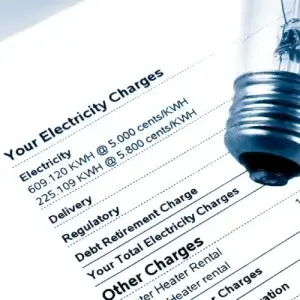Home / Compare Electricity & Ga… / Business electricity pla…
Business electricity plans
Compare the Market doesn’t currently offer energy plans for businesses, but visit us again in the future for any updates. If you’re a residential customer, you’re still able to compare both electricity and gas, provided you live in an eligible state or territory and meet the relevant eligibility criteria.



Key takeaways
If you have a small or medium business, you may be able to choose your electricity plan and retailer (large businesses may need to speak to a retailer directly). When taking out a business electricity plan, make sure you understand the following:
- While electricity plans may be similar between residential and business buildings, businesses tend to use more electricity, so your meter may be configured differently.
- Business electricity prices can vary depending on your distributor, your retailer, your meter configuration and where your business is located.
- Due to energy regulation, not all states will allow businesses to compare and choose their energy retailer.
About business electricity plans
Why switch small business electricity retailers?

- Save on your bills. You may find a business plan for your electricity with lower supply and usage charges and better features by shopping around.
- Take advantage of sign-up discounts. When business customers switch to a new plan, energy retailers could offer you a guaranteed discount, add credit to your account or offer lower fixed rates. Keep in mind that discounts tend to expire after a specified period.
- Seek better customer service. Bad customer experience is enough to send any Australian back to the market to find new deals. Find a retailer that offers flexible payment options, simple account management, great electricity rates and experience to suit your business needs.
Who can choose their business electricity retailer?
The increasing deregulation of energy markets across Australia means more small businesses can freely choose their electricity retailer, regardless of whether you’re a new customer or not.
If your business is located in New South Wales (NSW), south east Queensland (SE QLD), coastal South Australia (SA), Victoria (VIC) or the ACT, you may be able to change retailers or plans freely and take advantage of cheaper energy prices.
The government still sets energy rates in Western Australia (WA), regional QLD and the Northern Territory (NT). As a result, businesses in these areas can’t choose their electricity providers, although this may change in the future. While the government also sets energy rates in Tasmania (TAS), you may still be able to choose your retailer (although there isn’t a lot of choice).
How much does business electricity cost?
Your business’ electricity bills will vary depending on several factors, including the:
- Meter configuration at the business property
- Your business address, as electricity prices vary around Australia
- Retailer you choose
- Business tariff you’re on (e.g. a single rate tariff sets a single price for electricity usage)
- Electricity prices that retailers set (which includes the supply charge for electricity to be supplied to your business and the usage charge for the electricity your business consumes)
- Size of your business (e.g. number of employees)
- Energy needs for your business (e.g. a shop vs office)
Can my business use only green energy?
There’s no way to ensure your business uses only green energy, as the electricity includes various sources of energy. However, some retailers allow you to opt-in for green energy plans, where they purchase renewable energy on your behalf or make your business energy usage carbon neutral which offsets the emissions your energy usage creates.
Read the plan information before choosing a new business plan to understand the specifics, including what tariffs you’re on, the usage and supply charges, any carbon-neutral add-ons and what discounts may apply.
Important to know
What’s the difference between residential and business electricity?
The main difference between residential and business electricity plans is that businesses typically use more electricity and attract different rates and tariffs than you’d find in a residential plan.
Meters can also be different for businesses. Small business meters don’t look that different from residential ones, but they’re configured differently and have different tariffs. Furthermore, residential conversion of a commercial property can result in a resident having a business meter and vice versa.
What’s the difference between a standing offer and a market offer?
A standing offer, priced at the same rate as the Default Market Offer (DMO), is an electricity contract where the price is set by the Australian Government each year and applied to NSW, SA and SE QLD. It’s a fair and standard price that doesn’t offer any discounts or perks.
Market offers are generally cheaper than a standing offer and are usually better for your business as they may offer discounts and rewards to keep electricity prices down. All market offers in these states use the DMO as a reference price to allow you to compare whether a market offer is proving value; that is, if it’s estimated to cost less than being on a standing offer.
VIC uses a similar process to the DMO known as the Victorian Default Offer (VDO), but these prices are set by VIC’s Essential Services Commission.
Will I lose the power supply at my premises when I switch?
You shouldn’t expect a power interruption if you’re simply switching energy plans at your current premises. However, if you’re moving locations, there may not be power at the new property or it may be scheduled to be disconnected by the previous property owner.
Just let your new energy retailer know your intended move date to arrange the connection with your electricity distributor at the new premises.
An upcoming move to a new premises is a good opportunity to start planning ahead and shopping around – you should ideally apply for an electricity plan at least five business days ahead of the move-in date.
However, keep in mind there may be exit fees depending on which provider you’re currently with and the type of energy plan you’re on, so refer to the terms and conditions of your plan for the full details.
Energy-saving tips for your small to medium business
Heating, cooling and ventilation

- Consider investing in solar panels. On top of decreasing your electricity bills, installing solar panels can be an excellent business investment. Depending on where your business is, you can take advantage of feed-in tariffs – meaning you get credited for the electricity fed back into the grid from your solar panels. This helps manage the heating and cooling expenses of your business.
- Set up ducted air conditioning. While it can be costly to install, ducted air conditioning systems can be the most energy-efficient cooling and/or heating option.
- Automate your thermostat. If you have a wall-mounted temperature controller at your premises, it may save on energy by automating your thermostat to adjust the temperature on your behalf, rather than adjusting it manually.
- Turn off the air conditioner for the last business hour. Powering down the aircon before you’re finished for the day is a way of minimising afternoon energy costs.
- Use natural ventilation when you can. Using a ceiling or floor fan instead of an air conditioning unit or keeping the windows open in good weather lowers your energy use and could make a big difference to your energy bills.
- Choose the right type of insulation. If you’re building your new workplace or renovating an existing building, choosing the right type of insulation for your climate will help lower your heating or cooling costs.1
- Draught-proof your premises. Properly sealing your building and making sure doors and windows are shut can help keep the heat inside in winter and keep the place cool in summer.2
Hot water
- Consider installing a gas heater for your hot water system. Gas heaters are often more cost- and energy-efficient than electrical heaters.
- Look into getting a solar hot water system. Aside from being a common renewable energy solution, ‘going solar’ may be a way of slashing hot water bills.
- Consider getting a heat pump. An electric heat pump can be an excellent way to save on hot water costs, especially if it’s been run on solar power.
Lighting
- Install energy-efficient lamps. Using LED lights instead of incandescent or halogen light bulbs can help save on lighting costs.3
- Clean the lamps every six months. Dirty light bulbs emit less light while using the same amount of electricity as clean ones. Dusty light covers, in turn, reflect low amounts of light.
- Use lighting fixtures with a dimmer. There’s no reason for a dimmer to be less efficient in the workplace than in a home setting.
Electronic devices
- Switch off at the wall. If you don’t switch appliances off at the wall, you’ll still be using ‘standby power’ which can add to your electricity bill.
- Invest in a good powerboard. Some newer models can detect when devices are in standby mode and will cut off the electricity supply to those draining power.
- Look into appliances with high Energy Star Ratings. The higher the star rating on an appliance, the more energy-efficient it will be.
Fridges
- Choose the right size. Large, improperly stocked refrigerators waste energy on cooling empty spaces. Learn more about choosing – and using – energy-efficient appliances.
- Maintain your refrigerator. Making a habit of cleaning and defrosting your fridge ensures both good hygiene and electricity economy. Ice build-up in a fridge can eventually lead to leakage, while dirt and dust can house bacteria.
Meet our energy expert, Meredith O’Brien
As the Head of Energy at Compare the Market, Meredith O’Brien believes in educating Australian customers about the everchanging gas and electricity market so they can adjust their energy usage habits and get the most out of their energy plans.
Meredith has six years within the energy industry, following 15 years of experience in financial services and is currently studying a Master of Business Administration. Meredith is a dedicated customer advocate who is passionate about empowering Australians to find the right products to suit their needs by removing the confusion from comparing.
Find out more about energy for your business
1 Your Home. Australian Government. Insulation. Last updated 2020. Accessed October 2023.
2 Australian Government: Department of Industry, Science, Energy and Resources. Reduce your energy bills. Accessed October 2023.
3 Australian Government: Department of Industry, Science, Energy and Resources. Lighting. Accessed October 2023.

